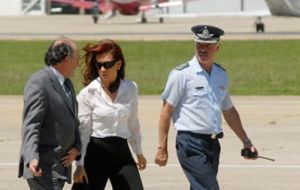MercoPress. South Atlantic News Agency
Cristina and Lula da Silva meet to address bilateral trade conflict
 Cristina in Brasilia to help Argentine trucks across the border
Cristina in Brasilia to help Argentine trucks across the border Argentina and Brazil presidents are scheduled to address trade disputes, Mercosur and other coming foreign policy issues when they meet Wednesday in Brasilia for their agreed regular contacts.
However this time the trade dispute is much more serious because hundreds of Argentine trucks remain delayed in border crossings (mostly loaded with perishables) and bilateral trade, which reached 31 billion US dollars in 2008, was falling at an annual rate of 30% in the first six months of the year following on Argentina’s imposition of non-automatic licences to imports.
Both countries are “intent in re-establishing the fluidity of bilateral trade” and establish understandings that help “to minimize conflicts” said an official release from the Brazilian chancellery.
In the second half of the year and responding to growing complaints from Brazilian exporters about Argentina’s “discretionary non automatic” licences, the administration of President Lula da Silva imposed a similar “slow down” process appealing to Customs bureaucratic methods.
In the last few weeks there have been formal and informal contacts to defuse the situation the latest of which between Argentina’s Foreign Affairs minister Jorge Taiana and his Brazilian peer, Celso Amorim, but “the final word” belongs to Presidents Cristina Kirchner and Lula da Silva “when they meet”.
Argentine Industry minister Deborah Giorgi who is part of the delegation flying to Brasilia said both countries are working “with open minds and in the best spirit”, but Argentina must ensure its “industrial development process”.
The meeting is in the framework of the six-month consulting process agreed between Argentina and Brazil at the end of 2007 with the purpose of making the integration process “more dynamic” both bilaterally and at Mercosur level (with junior members Paraguay and Uruguay).
According to Brazilian sources besides trade issues both presidents will address cooperation in fields such as nuclear energy, space science, technology, infrastructure and migration. Agreements on pharmacology, tourism and combating tropical diseases (particularly dengue) cooperation will also be signed.
The decision to name a bilateral committee to consider the technical, economic and environment viability of future hydroelectric developments along the shared river Uruguay is apparently ready to be agreed.
In foreign policy, the Honduras political crisis and the coming November 29th elections, the Venezuela-Colombia conflict and the Copenhagen Climate Change global summit will be considered by both leaders according to Brazilian sources.




Top Comments
Disclaimer & comment rulesCommenting for this story is now closed.
If you have a Facebook account, become a fan and comment on our Facebook Page!